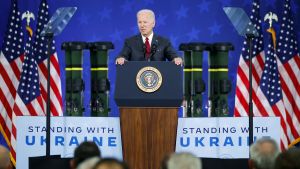Ukrainian Refugees—the Rule or the Exception?

Why are Ukrainians receiving a warmer welcome from the American public than past refugee groups?
Since the beginning of the Russian invasion of Ukraine, surveys have consistently found high support for Kyiv among the American people. Public support and sympathy have remained steadfast as the war drags on, despite the conflict-associated economic burdens that Americans have endured in recent months. One key way that Americans say they are prepared to support Ukraine is by accepting refugees fleeing the conflict into the United States. This popular support for accepting Ukrainian refugees may come as a surprise to some given how chilly American attitudes toward refugees have been during some past international crises. Are American attitudes toward refugees shifting over time? Or is there something specific about Ukrainian refugees that is triggering this uncharacteristically warm welcome?
US Support for Ukrainian Refugees Consistently High
Between February and July, the United States accepted over 100,000 Ukrainian refugees who had fled their country due to the Russian invasion, a move a majority of Americans support. The 2022 Chicago Council Survey, conducted July 15–August 1, finds that 76 percent of Americans are in favor of accepting Ukrainian refugees into the United States. This support has stayed remarkably consistent, even as the conflict drags on and more Ukrainians are displaced. In fact, Council polling from March 25–28 found a similar level of support for admitting refugees (74%).
Recent polling also indicates broad agreement with the underlying principles of the right to seek asylum in another country. An April 22–May 6, 2022 poll from Ipsos revealed that 82 percent of Americans agree with the statement that “people should be able to take refuge in other countries, including the United States, to escape from war or persecution.” However, when looking at US history, the friendly reception enjoyed by Ukrainian refugees has not been extended to all.
A History of Opposition to Refugees
When examining instances where there has been a displacement of people globally, the US public has not been historically welcoming. Americans have long opposed accepting refugees into the United States, even during some of the world’s darkest moments like World War II.
A series of polls from Gallup demonstrate how this pattern of disapproval has applied to different refugee groups throughout history, but may have softened somewhat in recent years. While these questions do vary between crises in terms of wording and number of proposed refugees, they exemplify how throughout US history a majority of Americans have been hesitant to accept large numbers of refugees. The exceptional nature of American openness to Ukrainian refugees is highlighted by the fact that Gallup’s Ukraine item, which is met with significantly higher approval than even the next closest item (Kosovo), proposes admitting thousands of times the number of refugees.
So, what might be driving this consistent anti-refugee sentiment among Americans? One cause could be skepticism about people who should not qualify for legitimate refugee status taking advantage of the system. The April–May 2022 Ipsos poll also shows that half of Americans agree with the statement “most foreigners who want to get into my country as a refugee really aren’t refugees. They just want to come here for economic reasons, or to take advantage of our welfare services.” While a significant portion of Americans reject this claim (39%), half of the public is enough people to indicate that this is a prominent view in American society.
The even more recent example of Afghanistan shows that this overwhelming support for Ukraine is still unprecedented. In the case of Afghan refugees fleeing the country after the US withdrawal in 2021, polling found that Americans supported accepting those who had worked with the United States but were hesitant to open the country’s doors to everyday Afghans fleeing Taliban rule. According to an NPR/Ipsos poll from September 1–2, 2021, 69 percent of Americans supported evacuating Afghans who worked with the United States and resettling them in the United States, but only 40 percent supported raising the general number of refugees allowed into the country each year. Similarly, the 2022 Chicago Council Survey finds that while most Americans support accepting Afghans who worked with the United States during the war (76%), that support drops significantly when respondents are asked about accepting everyday Afghans fleeing Taliban rule (56%).
Why Ukraine?
While support for accepting refugees has crossed the majority threshold in a number of situations that Gallup has polled about in recent decades, support for Ukrainian refugees is significantly higher than for any other refugee group. Why might Americans be more welcoming to Ukrainians than they have been to others?
One factor that likely influences American openness to different refugee groups is their perception of the refugees’ countries of origin. For example, on the Gallup poll, Americans are over 40 percentage points more supportive of Ukrainian refugees than they were of Syrian refugees, despite the fact that the number of refugees proposed in the Ukrainian case was 10 times higher than the number of Syrian refugees proposed in the 2015 question. Council polling on these two crises has yielded similar findings. In a June 27–July 19, 2017 poll, only 41 percent of Americans supported accepting Syrian refugees into the United States, compared to 76 percent support for Ukrainian refugees in July 2022. This may be partially due to the different perceptions that Americans have of Ukraine and Syria. A YouGov poll from March 19–22, 2022 showed that 76 percent of Americans consider Ukraine as an ally/friend to the United States whereas only 13 percent of Americans classify Syria as such. Some experts say that support for Syrian refugees was also impacted by perceived security threats after the terrorist attacks in San Bernardino in 2015. Ukrainians, on the other hand, have largely been depicted by experts, the media, and President Biden not as threats, but as victims of an attack on an independent Ukraine and democracy itself. The idea that Americans are willing to accept Ukrainian refugees because they are victims of great power aggression is bolstered by the fact that they also display tremendous willingness to accept Taiwanese refugees in the case of a Chinese invasion of the island (67%). When it comes to evaluating different refugee groups, Americans appear to keep in mind the age-old saying “the enemy of my enemy (or at least fierce competitor) is my friend.”


Related Content
 Public Opinion
Public Opinion
Survey results show the public remains supportive of US assistance to Ukraine—even if it means paying higher gas and food prices at home.
 Public Opinion
Public Opinion
Is the looming economic crisis influencing the public’s preferred response to the war in Ukraine? Recent polling suggests it's possible.
 Defense and Security
Defense and Security
Roughly $24 billion in military aid has been authorized for Ukraine since August—dwarfing total US assistance to the country in all previous years.
 Public Opinion
Public Opinion
A new poll reveals that Americans see Russia as a significant threat to US interests and support military and economic assistance to Ukraine.